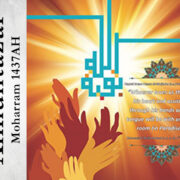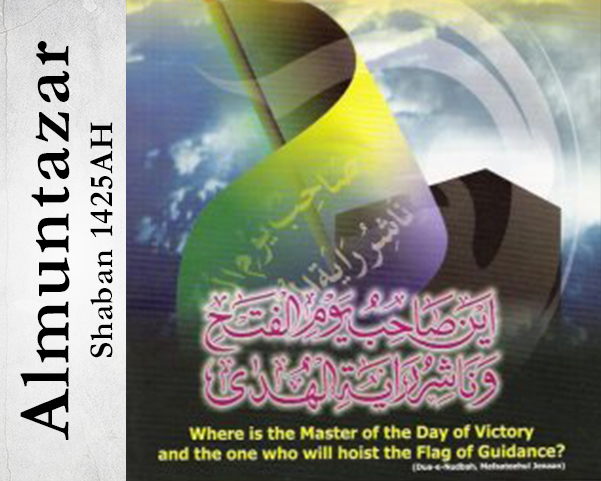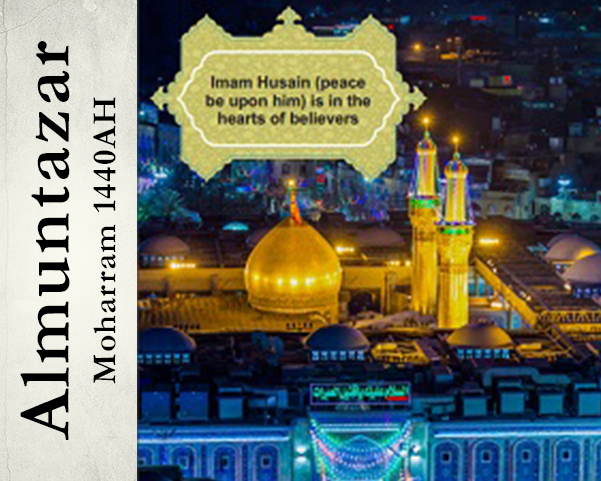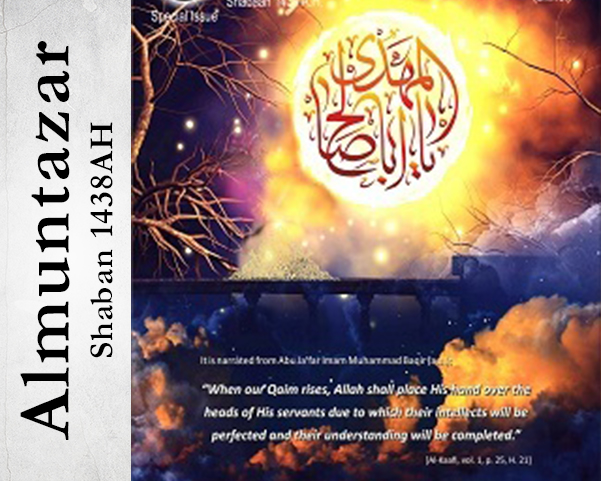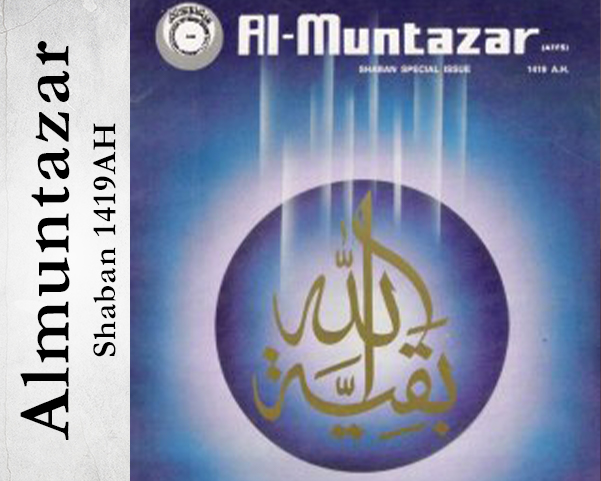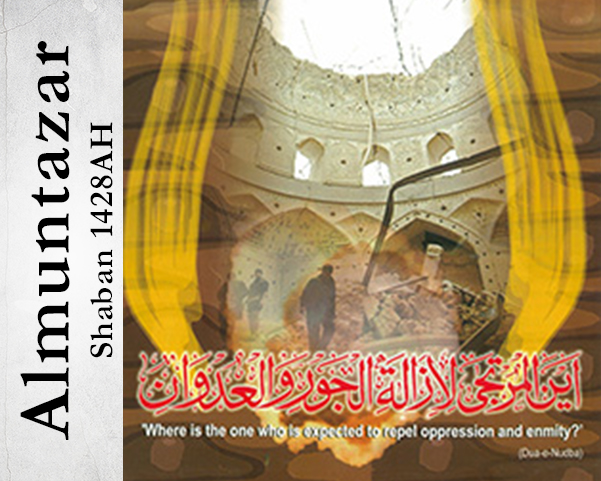During my childhood my uncles, aunts, grandparents and other elders at home would take me to Azaakhaana [1] and thus inculcated this habit within me. In fact, we were taken for Majaalis in infancy itself and the voices of mourning and elegies reached our ears. We grew up in that atmosphere slowly and gradually the affection to these gatherings strengthened by the day. When we started comprehending few things, we noticed that the Azaakhaana was decorated and part of those decorations were strips of black cloth on which certain things were written in red, blue and yellow colours. We however did not pay attention to them. But with the passage of time and changing conditions we received some education and stepped into our youth.
The strips we saw in our childhood were, fully or partially, reserved in some corner of our mind. After learning the Persian language to some extent we now started reading those strips in parts and found out the following to be written on them:
Baaz een che shoorish ast ke dar khalq-e-aalam ast
Then what is this hue and cry in the universe?
I also understood the second sentence and read several of them after certain attempts and started comprehending them.
Who wrote these couplets?
These couplets belong to a very famous Persian poet Shams al-Sho’ara Mohtasham Kaashaani Ali Ibn Ahmad. He was born in 905 A.H. in the Iranian city of Kaashaan and passed away at the age of 91 in 996 A.H. in Kaashaan itself and was buried in the same city. He lived in the initial rule of Safavi dynasty. Mohtasham was a poet from his youth itself but initially he penned songs. However, after inclining towards religion, he changed his topics and wrote elegies on the tragedy of Ahle Bait (peace be upon them) and attained great fame.
The beginning of composing elegies
Mohtasham was fond of writing from his youth and hence was given the title ‘Kalk al-Shi’aar’ by his contemporaries i.e. someone who had a carefree attitude. However, an incident in which his brother Abdul passed away in Deccan, India made him compose elegies and he penned a heart rending elegy for him. He also composed an elegy on the death of his nephew and thence began his journey of composing elegies.
Ameerul Momineen (peace be upon him) in a dream
Marhoom Haaj Mulla Ali Khayabani Tabrizi writes about Mohtasham Kaashaani in his book ‘Waqaaye’ al-Ayyaam’:
“When his nephew passed away, Mohtasham penned an elegy. One night he saw Ameerul Momineen Ali Ibn Abi Talib (peace be upon both of them) in his dream saying: ‘You wrote an elegy for your nephew but not for my son Husain!’
He woke up and thought about his dream. The succeeding night also he saw Ameerul Momineen (peace be upon him) in his dream saying: ‘Compose elegies for my son Husain.’
Mohtasham said: May I be your ransom, the tragedy of Imam Husain (peace be upon him) is beyond comprehension and description and I am unable to decide where to start from.
Ameerul Momineen (peace be upon him) then told him to start with the following verse:
‘Baaz een che shoorish ast ke dar khalq-e-aalam ast’
Then what is this hue and cry in the universe?
By the grace of Ameerul Momineen (peace be upon him) and Imam Zamana (may Allah hasten his reappearance) he wrote several verses after waking up till he reached the following line:
Hast az malaal gar che baree zaat e Zul Jalaal
No doubt, there is no feeling of grief within Allah, the Mighty.
He was not able to write the next line for the next several days until he saw Imam-e-Zamana (may Allah hasten his reappearance) in his dream, who completed the couplet for him thus:
Oo dar dil ast wa heech dilee bee malaal neest
He (Allah) is in the heart and no heart is free from grief.
[Waqaaye’ al-Ayyaam by Khayabani, p. 58]Note:
In the book Al-Kalaamo Yajurr al-Kalaam, vol. 2, p. 110 this incident is mentioned with a slight difference where Holy Prophet (peace be upon him and his progeny) has been mentioned in place of Ameerul Momineen (peace be upon him). In short, the first phrase is from an infallible (Then what is this hue and cry in the universe?) and the fifth phrase (He (Allah) is in the heart and no heart is free from grief) is by Imam Zamana (may Allah hasten his reappearance).
How this elegy became famous?
This elegy is known in Persian literature as the ‘Elegy of Twelve stanzas’ and as mentioned, it has come from Holy Prophet (peace be upon him and his progeny) or Ameerul Momineen (peace be upon him) and hence it is widely accepted and found in every mosque, lane, Azakhana and wall in Iran. This elegy is also echoed in India, Pakistan and other countries.
Opinion of Shaikh Abbas Qummi (may Allah have mercy upon him)
The great traditionalist and author of Mafaateeh al-Jinaan Shaikh Abbas Qummi (may Allah have mercy upon him) writes:
“Mohtasham, the poet, who composed the famous elegy and whose position is evident in every Majlis of Imam Husain (peace be upon him), affixed on every door and wall, has written this elegy either with great sorrow or mixed it with the soil of Karbala. This does not in any way let the tragedy of Imam Husain (peace be upon him) fade away and brings out the high status of Mohtasham and his level of (Imam) cognition.”
[Deewaan-e-Mohtasham Kaashaani by Saeed Qaane’i, p. 20]Wailing of Holy Prophet (peace be upon him and his progeny) on the elegy of Mohtasham
Muqbil Kaashaani was a very famous poet and desirous of visiting the mausoleum of Imam Husain (peace be upon him) but was unable to do so due to financial constraints. When anyone would head for Ziyaarat of Imam Husain (peace be upon him), his eyes would well with tears and his desire for Ziyaarat would intensify. One day, a friend of his arranged the finances for his journey and he set out from Kaashaan for Karbala. However his caravan was robbed by dacoits near Golpaygaan. Some members of the caravan returned to Kaashaan while others went to Golpaygaan to arrange expenses for the remaining journey through their acquaintances. However Muqbil had no acquaintances in Golpaygaan. He neither wanted to borrow money from anyone nor return to Kaashaan. The desire for Ziyaarat of Imam Husain (peace be upon him) was brimming in his heart. He thought he has already covered some distance and will work to gather expenses for the remaining journey to Karbala.
He stayed in Golpaygaan for some days and the month of Muharram arrived. He participated in Majaalis like other Shias and the night of Aashura arrived. He read his elegy and a huge wailing and mourning ensued. The same night after the Majlis concluded, he dreamt that he is in the courtyard of the shrine of Imam Husain (peace be upon him). He attempted to go near the tomb but was not permitted.
Muqbil quotes: I thought that O Allah, none should prevent anyone from entering the shrine. A person told me that you are right Muqbil but presently Janabe Fatima Zahra, Khadijah al-Kubra, Aasiya, Haajra and Saarah (peace be upon them) along with few fairies (al-hoor al-een) are busy inside the shrine and you being a stranger (na-mahram) are not allowed. I asked ‘Who are you?’ He said, ‘I am from the group of angel surrounding the shrine of Imam Husain (peace be on him) (‘al-Haaffeen al-Malaaekah)’. Do not be dejected and come with me. I will take you inside from the other side’. In the courtyard towards the west of the mausoleum, a large gathering was being held. I asked the angel about those present there. He replied that all Prophets from Adam (peace be upon him) to Prophet Muhammad Mustafa (peace be upon him and his progeny) have arrived for the Ziyaarat of the sacred grave of Imam Husain (peace be upon him). I saw that Holy Prophet (peace be upon him and his progeny) instructed: ‘Go and call Mohtasham.’ I saw the short statured Mohtasham arriving with his radiant face and worn out turban. Holy Prophet (peace be upon him and his progeny) directed him to ascend a pulpit nearby. Every step of the pulpit where Mohtasham stood at, the Holy Prophet (peace be upon him and his progeny) ordered him to ascend further until he reached Arshah, the ninth and the highest step of the pulpit. He stood there and waited for the command from Holy Prophet (peace be upon him and his progeny) who said, ‘O Mohtasham, this is the night of Aashura, recite your heart rending elegy.’
Mohtasham complied with the orders and began reciting.
O the ship wrecked in the storm of Karbala
The plain of Karbala drenched in blood and soil
If the entire universe wails loudly upon them
The vicinity of Karbala will be replete with blood
When Imam Husain (peace be upon him) was martyred in wilderness of Karbala
There remained no eye that was not filled with tears
The Kufans invited this guest and kept him thirsty
And were happy at shedding his blood
Everyone in Karbala had access to water
But for the king of Karbala was a drought
The thirsty ones were kept at a distance from water
And the voices of thirst, thirst echoed from the wilderness
The army of the enemy did not respect him and turned to his tents
He (peace be upon him and his progeny) ordered Mohtasham to recite more and Mohtasham continued:
When the sacred head of Imam Husain (peace be upon him) was raised on a spear
The sun came out dejected from the clouds
There was tumult in the waves and they rose till the mountains
The clouds rained heavily and profusely in tears
The stable land of Karbala went into mayhem
The whole creation went into disorder
The foundation of the universe went into a shiver
It appeared like the Day of Judgement has arrived
The tent, the ropes of which were the forelocks of the fairies
Was uprooted by the wind and filled with smoke
The one whose saddle was held by Jibraeel
Mounted a camel without a saddle
The nation of the Prophet after this heinous act
Has turned disgraceful for the soul of the Prophet
The mourning on this elegy was so severe that it appeared to reach the Divine Empyrean. Mohtasham intended to descend from the pulpit but Holy Prophet (peace be upon him and his progeny) said: ‘Continue reciting as my heart is not satisfied with mourning yet.’ Mohtasham complied with the order, removed his turban and in a heart rending voice said: O Messenger of Allah!
The one who was martyred in a wilderness were you O Husain
The one who was rubbing his hands and feet in blood like a hunted were you O Husain
Muqbil narrates that when Mohtasham read this line, the Messenger of Allah (peace be upon him and his progeny) fell unconscious and all the Prophets (peace be upon him) wailed louldly, beating their heads. Meanwhile, an angel read these lines:
Be quiet Mohtasham as the hearts of stones have melted
The foundations of patience and forbearance are now broken
This heart rending elegy has burnt the birds and the fishes
With your elegy the eyes have wept tears
And the earth has been scorched with this grief
Be quiet Mohtasham as the sky is weeping blood
And a thousand rivers are now in tumult
Be quiet Mohtasham for the sun due to your elegy
And the mourning of mourners has frozen down
Be quiet Mohtasham for Jibraeel is hiding from the Prophet
Due to the grief of Husain
Mohtasham became silent and descended from the pulpit. After some time when the gathering recouped, the Holy Prophet (peace be upon him and his progeny) awarded Mohtasham with his cloak.
The request from Janabe Zahra (peace be upon her)
Muqbil says that I was also a poet of Ahle Bait (peace be upon them) and wanted the Holy Prophet (peace be upon him and his progeny) to order me to recite my composition. I waited but left from the sanctuary in a state of dejection. I saw that a fairy came to me and said that Janabe Zahra (peace be upon her) came to her father and requested him to ask Muqbil also to recite his elegy. I went to the first step of the pulpit. However Holy Prophet (peace be upon him and his progeny) did not ask me to ascend further and I understood that my position is not akin to Mohtasham. I started reciting my elegy:
Now neither the Zuljanah can remain steadfast
Nor does the chief of martyrs has the energy to fight
When the black storm of the enemy’s army blew
The beloved of Fatima (peace be on her) fell from the horse
A king of high position came down to the earth
Or if I am not wrong, the Divine Empyrean fell on the earth
Muqbil says that a fairy came to me and asked me to stop as Janabe Zahra (peace be upon her) has fallen unconscious. I descended from the pulpit but the Holy Prophet (peace be upon him and his progeny) did not reward me. In a state of dream I saw Imam Husain (peace be upon him) telling me from his severed head:
‘O Muqbil! I will myself gift you a cloak.’
I woke up and the next day a caravan intending to visit Imam Husain (peace be upon him) took me along.
[Manaabe’ Wasaael al-Shia, vol. 14, p. 597; Waqaaye’ al-Ayyaam by Khayabani, p. 59]This shows the position of Mohtasham near Holy Prophet (peace be upon him and his progeny) and Ameerul Momneen (peace be upon him) and also that of Muqbil before Janabe Zahra (peace be upon her) and Imam Husain (peace be upon him). Indeed, Imam Husain (peace be upon him) does not deprive his lovers of his Ziyaarat in this world and intercession in the hereafter. May Allah grant us the love which Mohtasham and Muqbil had so that we can receive special favours from Imam Husain (peace be upon him) and the one who will avenge his blood!
In the end, it is necessary to mention that all phrases in the elegy of Mohtasham are supported by traditions; however, we have not mentioned them for the sake of brevity. We would humbly like to say that the revered poets of Ahle Bait (peace be upon them) are aware of verses of Holy Quran and the traditions and their works are replete with their meanings. Our revered scholars also have achieved great feats in this field.
Allamah Sayed Muhammad Mahdi famous as Bahr al-Uloom (may Allah have mercy upon him) has also written a twelve stanza elegy in Arabic which is famous as ‘Al-Uqood al-Ithna Ashara fi risaa Saadaat al-Bashar’. Insha Allah, we will present the same before our esteemed readers if we get an opportunity and good fortune in the future.
O Aba Abdillah al-Husain! Please accept this humble work from us and just like Mohtasham and Muqbil, reward us too.
[1] Places where mourning gatherings during Muharram are held
The strips we saw in our childhood were, fully or partially, reserved in some corner of our mind. After learning the Persian language to some extent we now started reading those strips in parts and found out the following to be written on them:
Baaz een che shoorish ast ke dar khalq-e-aalam ast
Then what is this hue and cry in the universe?
I also understood the second sentence and read several of them after certain attempts and started comprehending them.
Who wrote these couplets?
These couplets belong to a very famous Persian poet Shams al-Sho’ara Mohtasham Kaashaani Ali Ibn Ahmad. He was born in 905 A.H. in the Iranian city of Kaashaan and passed away at the age of 91 in 996 A.H. in Kaashaan itself and was buried in the same city. He lived in the initial rule of Safavi dynasty. Mohtasham was a poet from his youth itself but initially he penned songs. However, after inclining towards religion, he changed his topics and wrote elegies on the tragedy of Ahle Bait (peace be upon them) and attained great fame.
The beginning of composing elegies
Mohtasham was fond of writing from his youth and hence was given the title ‘Kalk al-Shi’aar’ by his contemporaries i.e. someone who had a carefree attitude. However, an incident in which his brother Abdul passed away in Deccan, India made him compose elegies and he penned a heart rending elegy for him. He also composed an elegy on the death of his nephew and thence began his journey of composing elegies.
Ameerul Momineen (peace be upon him) in a dream
Marhoom Haaj Mulla Ali Khayabani Tabrizi writes about Mohtasham Kaashaani in his book ‘Waqaaye’ al-Ayyaam’:
“When his nephew passed away, Mohtasham penned an elegy. One night he saw Ameerul Momineen Ali Ibn Abi Talib (peace be upon both of them) in his dream saying: ‘You wrote an elegy for your nephew but not for my son Husain!’
He woke up and thought about his dream. The succeeding night also he saw Ameerul Momineen (peace be upon him) in his dream saying: ‘Compose elegies for my son Husain.’
Mohtasham said: May I be your ransom, the tragedy of Imam Husain (peace be upon him) is beyond comprehension and description and I am unable to decide where to start from.
Ameerul Momineen (peace be upon him) then told him to start with the following verse:
‘Baaz een che shoorish ast ke dar khalq-e-aalam ast’
Then what is this hue and cry in the universe?
By the grace of Ameerul Momineen (peace be upon him) and Imam Zamana (may Allah hasten his reappearance) he wrote several verses after waking up till he reached the following line:
Hast az malaal gar che baree zaat e Zul Jalaal
No doubt, there is no feeling of grief within Allah, the Mighty.
He was not able to write the next line for the next several days until he saw Imam-e-Zamana (may Allah hasten his reappearance) in his dream, who completed the couplet for him thus:
Oo dar dil ast wa heech dilee bee malaal neest
He (Allah) is in the heart and no heart is free from grief.
[Waqaaye’ al-Ayyaam by Khayabani, p. 58]Note:
In the book Al-Kalaamo Yajurr al-Kalaam, vol. 2, p. 110 this incident is mentioned with a slight difference where Holy Prophet (peace be upon him and his progeny) has been mentioned in place of Ameerul Momineen (peace be upon him). In short, the first phrase is from an infallible (Then what is this hue and cry in the universe?) and the fifth phrase (He (Allah) is in the heart and no heart is free from grief) is by Imam Zamana (may Allah hasten his reappearance).
How this elegy became famous?
This elegy is known in Persian literature as the ‘Elegy of Twelve stanzas’ and as mentioned, it has come from Holy Prophet (peace be upon him and his progeny) or Ameerul Momineen (peace be upon him) and hence it is widely accepted and found in every mosque, lane, Azakhana and wall in Iran. This elegy is also echoed in India, Pakistan and other countries.
Opinion of Shaikh Abbas Qummi (may Allah have mercy upon him)
The great traditionalist and author of Mafaateeh al-Jinaan Shaikh Abbas Qummi (may Allah have mercy upon him) writes:
“Mohtasham, the poet, who composed the famous elegy and whose position is evident in every Majlis of Imam Husain (peace be upon him), affixed on every door and wall, has written this elegy either with great sorrow or mixed it with the soil of Karbala. This does not in any way let the tragedy of Imam Husain (peace be upon him) fade away and brings out the high status of Mohtasham and his level of (Imam) cognition.”
[Deewaan-e-Mohtasham Kaashaani by Saeed Qaane’i, p. 20]Wailing of Holy Prophet (peace be upon him and his progeny) on the elegy of Mohtasham
Muqbil Kaashaani was a very famous poet and desirous of visiting the mausoleum of Imam Husain (peace be upon him) but was unable to do so due to financial constraints. When anyone would head for Ziyaarat of Imam Husain (peace be upon him), his eyes would well with tears and his desire for Ziyaarat would intensify. One day, a friend of his arranged the finances for his journey and he set out from Kaashaan for Karbala. However his caravan was robbed by dacoits near Golpaygaan. Some members of the caravan returned to Kaashaan while others went to Golpaygaan to arrange expenses for the remaining journey through their acquaintances. However Muqbil had no acquaintances in Golpaygaan. He neither wanted to borrow money from anyone nor return to Kaashaan. The desire for Ziyaarat of Imam Husain (peace be upon him) was brimming in his heart. He thought he has already covered some distance and will work to gather expenses for the remaining journey to Karbala.
He stayed in Golpaygaan for some days and the month of Muharram arrived. He participated in Majaalis like other Shias and the night of Aashura arrived. He read his elegy and a huge wailing and mourning ensued. The same night after the Majlis concluded, he dreamt that he is in the courtyard of the shrine of Imam Husain (peace be upon him). He attempted to go near the tomb but was not permitted.
Muqbil quotes: I thought that O Allah, none should prevent anyone from entering the shrine. A person told me that you are right Muqbil but presently Janabe Fatima Zahra, Khadijah al-Kubra, Aasiya, Haajra and Saarah (peace be upon them) along with few fairies (al-hoor al-een) are busy inside the shrine and you being a stranger (na-mahram) are not allowed. I asked ‘Who are you?’ He said, ‘I am from the group of angel surrounding the shrine of Imam Husain (peace be on him) (‘al-Haaffeen al-Malaaekah)’. Do not be dejected and come with me. I will take you inside from the other side’. In the courtyard towards the west of the mausoleum, a large gathering was being held. I asked the angel about those present there. He replied that all Prophets from Adam (peace be upon him) to Prophet Muhammad Mustafa (peace be upon him and his progeny) have arrived for the Ziyaarat of the sacred grave of Imam Husain (peace be upon him). I saw that Holy Prophet (peace be upon him and his progeny) instructed: ‘Go and call Mohtasham.’ I saw the short statured Mohtasham arriving with his radiant face and worn out turban. Holy Prophet (peace be upon him and his progeny) directed him to ascend a pulpit nearby. Every step of the pulpit where Mohtasham stood at, the Holy Prophet (peace be upon him and his progeny) ordered him to ascend further until he reached Arshah, the ninth and the highest step of the pulpit. He stood there and waited for the command from Holy Prophet (peace be upon him and his progeny) who said, ‘O Mohtasham, this is the night of Aashura, recite your heart rending elegy.’
Mohtasham complied with the orders and began reciting.
O the ship wrecked in the storm of Karbala
The plain of Karbala drenched in blood and soil
If the entire universe wails loudly upon them
The vicinity of Karbala will be replete with blood
When Imam Husain (peace be upon him) was martyred in wilderness of Karbala
There remained no eye that was not filled with tears
The Kufans invited this guest and kept him thirsty
And were happy at shedding his blood
Everyone in Karbala had access to water
But for the king of Karbala was a drought
The thirsty ones were kept at a distance from water
And the voices of thirst, thirst echoed from the wilderness
The army of the enemy did not respect him and turned to his tents
He (peace be upon him and his progeny) ordered Mohtasham to recite more and Mohtasham continued:
When the sacred head of Imam Husain (peace be upon him) was raised on a spear
The sun came out dejected from the clouds
There was tumult in the waves and they rose till the mountains
The clouds rained heavily and profusely in tears
The stable land of Karbala went into mayhem
The whole creation went into disorder
The foundation of the universe went into a shiver
It appeared like the Day of Judgement has arrived
The tent, the ropes of which were the forelocks of the fairies
Was uprooted by the wind and filled with smoke
The one whose saddle was held by Jibraeel
Mounted a camel without a saddle
The nation of the Prophet after this heinous act
Has turned disgraceful for the soul of the Prophet
The mourning on this elegy was so severe that it appeared to reach the Divine Empyrean. Mohtasham intended to descend from the pulpit but Holy Prophet (peace be upon him and his progeny) said: ‘Continue reciting as my heart is not satisfied with mourning yet.’ Mohtasham complied with the order, removed his turban and in a heart rending voice said: O Messenger of Allah!
The one who was martyred in a wilderness were you O Husain
The one who was rubbing his hands and feet in blood like a hunted were you O Husain
Muqbil narrates that when Mohtasham read this line, the Messenger of Allah (peace be upon him and his progeny) fell unconscious and all the Prophets (peace be upon him) wailed louldly, beating their heads. Meanwhile, an angel read these lines:
Be quiet Mohtasham as the hearts of stones have melted
The foundations of patience and forbearance are now broken
This heart rending elegy has burnt the birds and the fishes
With your elegy the eyes have wept tears
And the earth has been scorched with this grief
Be quiet Mohtasham as the sky is weeping blood
And a thousand rivers are now in tumult
Be quiet Mohtasham for the sun due to your elegy
And the mourning of mourners has frozen down
Be quiet Mohtasham for Jibraeel is hiding from the Prophet
Due to the grief of Husain
Mohtasham became silent and descended from the pulpit. After some time when the gathering recouped, the Holy Prophet (peace be upon him and his progeny) awarded Mohtasham with his cloak.
The request from Janabe Zahra (peace be upon her)
Muqbil says that I was also a poet of Ahle Bait (peace be upon them) and wanted the Holy Prophet (peace be upon him and his progeny) to order me to recite my composition. I waited but left from the sanctuary in a state of dejection. I saw that a fairy came to me and said that Janabe Zahra (peace be upon her) came to her father and requested him to ask Muqbil also to recite his elegy. I went to the first step of the pulpit. However Holy Prophet (peace be upon him and his progeny) did not ask me to ascend further and I understood that my position is not akin to Mohtasham. I started reciting my elegy:
Now neither the Zuljanah can remain steadfast
Nor does the chief of martyrs has the energy to fight
When the black storm of the enemy’s army blew
The beloved of Fatima (peace be on her) fell from the horse
A king of high position came down to the earth
Or if I am not wrong, the Divine Empyrean fell on the earth
Muqbil says that a fairy came to me and asked me to stop as Janabe Zahra (peace be upon her) has fallen unconscious. I descended from the pulpit but the Holy Prophet (peace be upon him and his progeny) did not reward me. In a state of dream I saw Imam Husain (peace be upon him) telling me from his severed head:
‘O Muqbil! I will myself gift you a cloak.’
I woke up and the next day a caravan intending to visit Imam Husain (peace be upon him) took me along.
[Manaabe’ Wasaael al-Shia, vol. 14, p. 597; Waqaaye’ al-Ayyaam by Khayabani, p. 59]This shows the position of Mohtasham near Holy Prophet (peace be upon him and his progeny) and Ameerul Momneen (peace be upon him) and also that of Muqbil before Janabe Zahra (peace be upon her) and Imam Husain (peace be upon him). Indeed, Imam Husain (peace be upon him) does not deprive his lovers of his Ziyaarat in this world and intercession in the hereafter. May Allah grant us the love which Mohtasham and Muqbil had so that we can receive special favours from Imam Husain (peace be upon him) and the one who will avenge his blood!
In the end, it is necessary to mention that all phrases in the elegy of Mohtasham are supported by traditions; however, we have not mentioned them for the sake of brevity. We would humbly like to say that the revered poets of Ahle Bait (peace be upon them) are aware of verses of Holy Quran and the traditions and their works are replete with their meanings. Our revered scholars also have achieved great feats in this field.
Allamah Sayed Muhammad Mahdi famous as Bahr al-Uloom (may Allah have mercy upon him) has also written a twelve stanza elegy in Arabic which is famous as ‘Al-Uqood al-Ithna Ashara fi risaa Saadaat al-Bashar’. Insha Allah, we will present the same before our esteemed readers if we get an opportunity and good fortune in the future.
O Aba Abdillah al-Husain! Please accept this humble work from us and just like Mohtasham and Muqbil, reward us too.
[1] Places where mourning gatherings during Muharram are held

